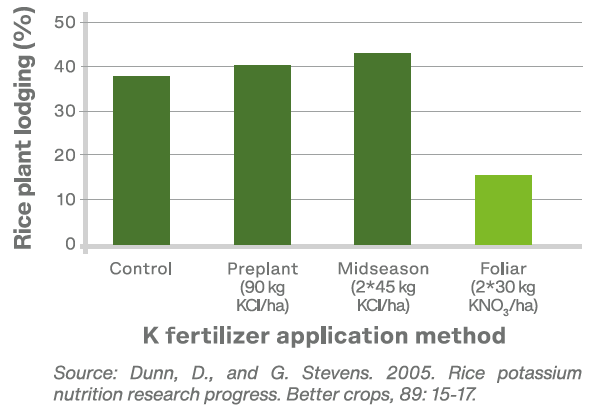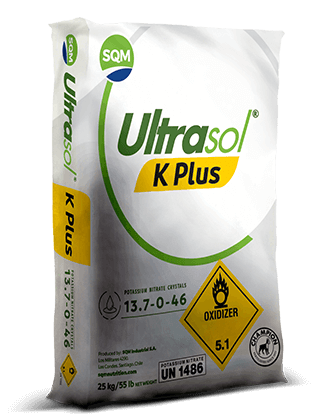Selecting the right fertilizer is a significant part of the equation to improve yield, quality and shelf lite of crops. But even more important is their application timing. Both laboratory and field tests (see charts) have pointed at foliar application of KNO3 as a powerful tool to boost the quality of harvest. Scientific research has demonstrated that numerous crops benefited from foliar sprays with KNO3.
This includes field crops like beans, cotton, and grain crops. lt has also been demonstrated that specialty crops treated with foliar spray tend to have a higher nutritional value. lmproved Total Soluble Solids (TSS) have contributed to increased sugar, vitamins, minerals and proteins in the harvested crops.
When does foliar application make a difference?
When we need to act fast. Foliar application allows the plant to absorb fertilizers through the leaves and other plant tissue, to make the nutrients more readily available for immediate use. This quick response of the plant to the nutrient application can allow farmers to add vital nutrients to correct mid-season deficiencies, help control physiological disorders such as stip and bitter pit, and complete sizing and maturation of fruits, or supplement soil applied nutrients.
There is a clear advantage of foliar application of nutrients in the case of adverse soil conditions, because one can overcome limitations of the soil and its ability to transfer nutrients into the plant. Also, foliar sprays give the grower full control of application frequency and the ability to blend the fertilizer with other products, such as micronutrients or pesticides.
Foliar application has become more important as growers are seeking to improve nutrient use efficiency, reduce losses due to leaching and fight pests and diseases. For example, in sandy and calcareous soils, foliar applied fertilizers can be 4 to 20 times more effective when compared with soil applied fertilizers.
Dr. David Dunn - scientist at the Delta Ag Center in Qulin, Missouri - and SQM's researchers were able to prove that foliar KNO3 sprays resulted in increased stalk strength in rice, which led to reduced lodging incidence. Lodging does not necessarily reduce yield, but will slow down harvest operation, which ultimately leads to greater operational cost per acre. Current formulations of liquid fertilizers are believed to mostly penetrate the transcuticular pores on foliage, which are virtually open ali the time compared to stomata. Nutrients also enter the stomata, but these are often closed due to environmental stress. Most stomata are located underneath leaves, away from fertilizer spray patterns.
Foliar application of KNO3 has an immediate effect, improving the yield, quality, and size of the fruits, reducing fruit splitting and storage breakdown, thus reducing waste of harvested food.
KNO3 maximizes citrus yield and profitability
University of Florida research demonstrates that a KNO3-based fertilizer program including three foliar applications of KNO3 at a rate of 25 lbs./ A/spray applied pre-bloom (mid-February), post-bloom (April) and at fruit fill (July/ August) increased yield and size of fresh market 'Valencia' orange when compared to an untreated control. Both the KNO3 based program and control program received standard recommended soil fertilizer applications 3 to 4 times throughout the season.
Table 1. The effect of 3 foliar applications with 25 lbs of potassium nitrate (KNO3) /acre/spray on 'Valencia' orange yield and grower's income.

Figure 1. Effect of K treatments on lodging of Baldo tall rice variety averaged across 1999 and 2000.

The following additional references were used to compile the article:
-http://www.citrusbr.com.brldownloadlFoliar_nutrition_forHLB.pdf
-https:llwww.semanticscholar.orglpaper/Effect-of-foliar-application-of-KN03-on-fruit-yield Pandey/f2b5799589f82cb859c606364e4e2721912c7327



